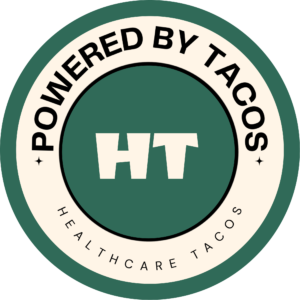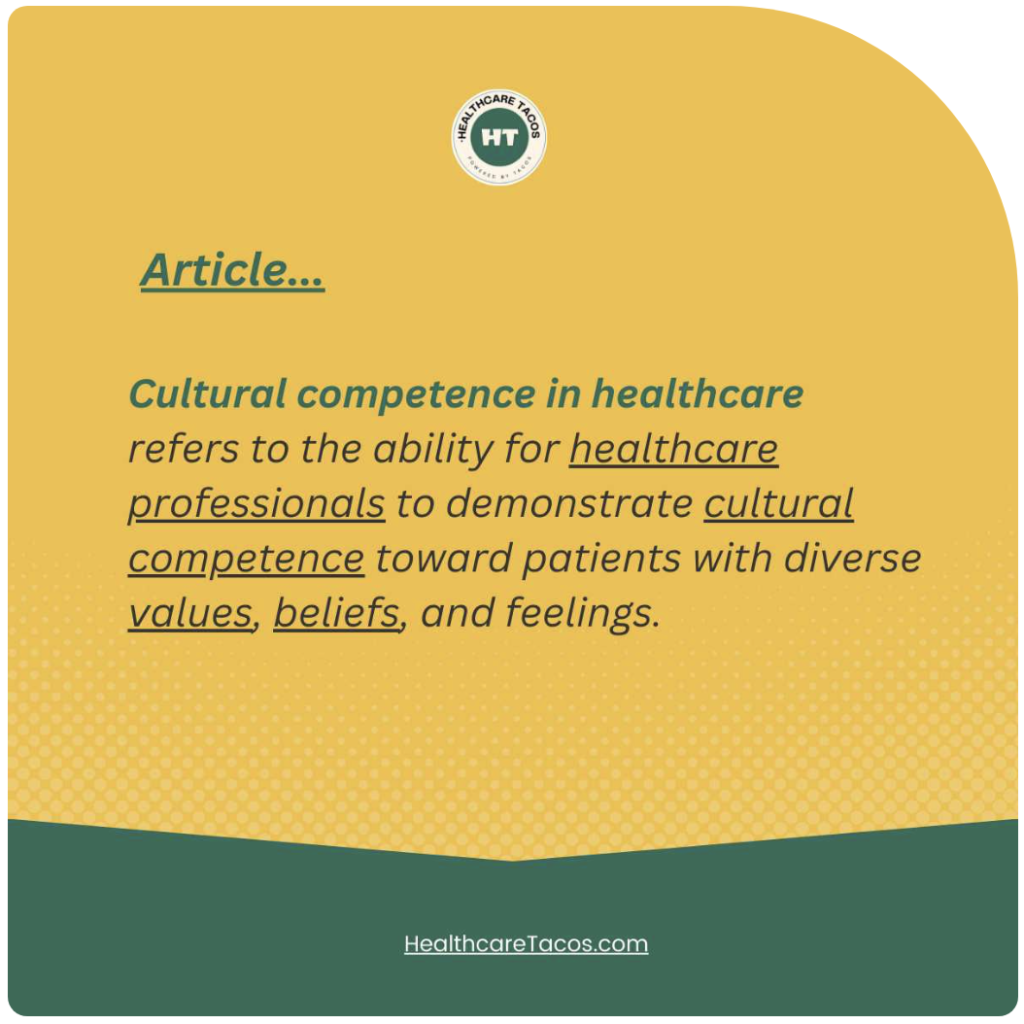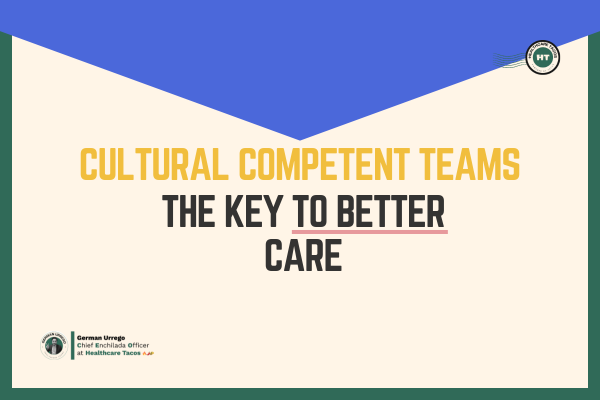

Amig@s – Let’s taco ‘bout Cultural Competent Teams.
In case you didn’t know.
The best healthcare happens when our teams truly connect with the communities they serve.
For our Hispanic patients.
It’s not just about speaking Spanish. It’s about understanding the whole picture, from family dynamics to traditional beliefs.
Ready to level up?
Start with lunch-and-learn sessions where team members share cultural insights.
You can even partner with local Hispanic community leaders because cultural awareness isn’t about checking boxes, as I always say.
It’s truly about building bridges that lead to better health.
Let’s taco ‘bout this enchilada.
Amig@s – Let’s taco ‘bout Cultural Competent Teams.
In case you didn’t know.
The best healthcare happens when our teams truly connect with the communities they serve.
For our Hispanic patients.
It’s not just about speaking Spanish. It’s about understanding the whole picture, from family dynamics to traditional beliefs.
Ready to level up?
Start with lunch-and-learn sessions where team members share cultural insights.
You can even partner with local Hispanic community leaders because cultural awareness isn’t about checking boxes, as I always say.
It’s truly about building bridges that lead to better health.
Let’s taco ‘bout this enchilada.
![]()
Three Insights 🌶️
I. Understand How Culture Shapes Decisions
Picture this.
Your patient brings their entire family to discuss treatment options.
In some settings, this might seem overwhelming.
But for many Hispanic families, big health decisions are family decisions. And that’s not a problem; it’s pure gold for better care.
Trust me.
Going beyond “cultural awareness.”
Means really getting why abuela’s opinion matters, or why some home remedies are trusted more than prescriptions.
These aren’t roadblocks; they’re chances to build care plans that actually work.
Want your team to make real connections?
Do this.
Start seeing these cultural differences as superpowers, not speed bumps.
Because at the end of the day. When we truly understand our patients’ world, we don’t just treat them better.
We heal them better.
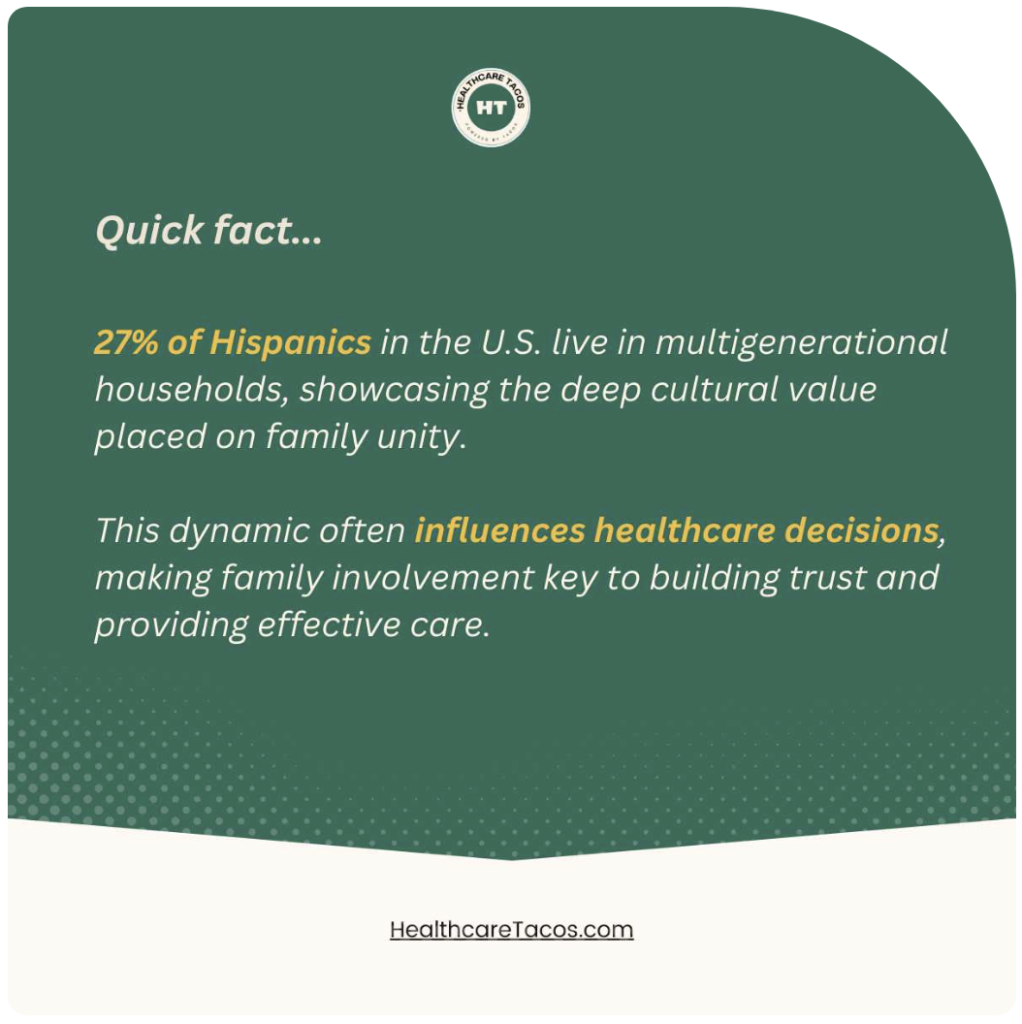
II. Cultural Learning Never Stops
Think of cultural awareness as a muscle; it gets stronger with regular exercise.
It’s not about sitting through one training session and calling it done.
It’s about building a team that’s curious, open, and always learning. So, my personal recommendation is never to be afraid to “Mix things up.”
Have team members share their own cultural experiences over lunch.
Bring in community leaders to tell it like it is.
You will see.
How quickly these real conversations transform your patient care from good to great.
Here is why.
When your team gets excited about understanding different perspectives, it shows.
What is best, patients feel it.
And that’s when healthcare really starts working for everyone.
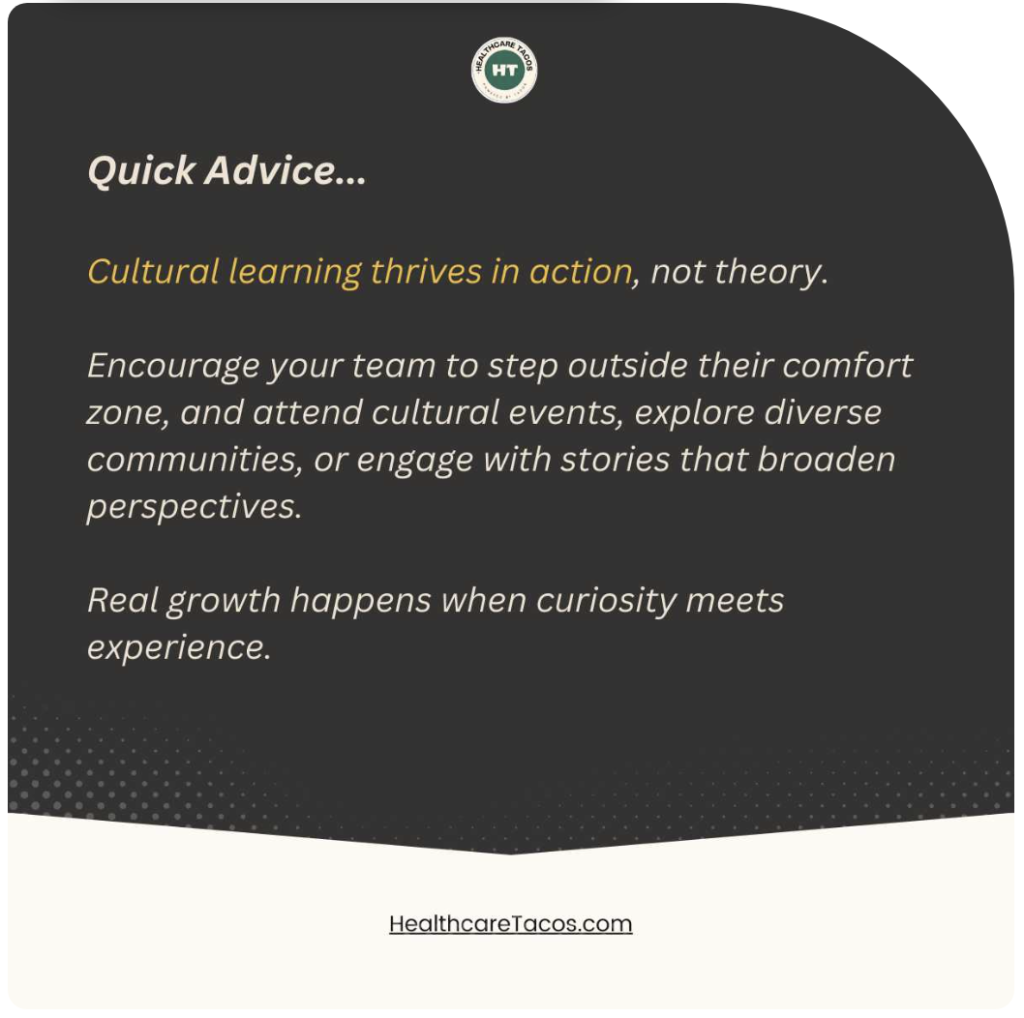
III. Foster Representation Within Teams
Just like in the real estate industry, location matters.
In our Hispanic world.
Representation, representation, representation matters.
When Hispanics see doctors, nurses, and staff who share their background, something magical happens.
Walls come down, trust builds up, and care gets better.
Now, just so you know, this isn’t just about hiring numbers.
It’s about creating spaces where diverse voices lead, where different experiences matter, and where every team member can grow into leadership roles.
In case you didn’t know.
When team reflects community, you’re not just providing care, you’re building bridges.
And that mis amigos, it is the winning LOTTO in the Hispanic community.
Think about it this way.
Who better to understand cultural nuances than someone who’s lived them?
Right?
So, let’s make healthcare feel like home.
Here is a note about cultural competence in healthcare I found on WIKIPEDIA. You will like it.
Insights
I. Understand How Culture Shapes Decisions
Picture this.
Your patient brings their entire family to discuss treatment options.
In some settings, this might seem overwhelming.
But for many Hispanic families, big health decisions are family decisions. And that’s not a problem; it’s pure gold for better care.
Trust me.
Going beyond “cultural awareness.”
Means really getting why abuela’s opinion matters, or why some home remedies are trusted more than prescriptions.
These aren’t roadblocks; they’re chances to build care plans that actually work.
Want your team to make real connections?
Do this.
Start seeing these cultural differences as superpowers, not speed bumps.
Because at the end of the day. When we truly understand our patients’ world, we don’t just treat them better.
We heal them better.
II. Cultural Learning Never Stops
Think of cultural awareness as a muscle; it gets stronger with regular exercise.
It’s not about sitting through one training session and calling it done.
It’s about building a team that’s curious, open, and always learning. So, my personal recommendation is never to be afraid to “Mix things up.”
Have team members share their own cultural experiences over lunch.
Bring in community leaders to tell it like it is.
You will see.
How quickly these real conversations transform your patient care from good to great.
Here is why.
When your team gets excited about understanding different perspectives, it shows.
What is best, patients feel it.
And that’s when healthcare really starts working for everyone.

III. Foster Representation Within Teams
Just like in the real estate industry, location matters.
In our Hispanic world.
Representation, representation, representation matters.
When Hispanics see doctors, nurses, and staff who share their background, something magical happens.
Walls come down, trust builds up, and care gets better.
Now, just so you know, this isn’t just about hiring numbers.
It’s about creating spaces where diverse voices lead, where different experiences matter, and where every team member can grow into leadership roles.
In case you didn’t know.
When team reflects community, you’re not just providing care, you’re building bridges.
And that mis amigos, it is the winning LOTTO in the Hispanic community.
Think about it this way.
Who better to understand cultural nuances than someone who’s lived them?
Right?
So, let’s make healthcare feel like home.
Here is a note about cultural competence in healthcare I found on WIKIPEDIA. You will like it.
![]()
Two Actionable Steps 🌮
I. Make Culture Training Count
Listen up.
Monthly training shouldn’t feel like another checkbox.
Mix it up with your team.
Simply get them roleplaying real patient scenarios and swapping stories about cultural learning moments.
These real experiences teach us more than any handbook ever could.
Also, before I forget.
Do yourself a favor and skip the boring slides.
Instead, dig into what matters.
Why a patient says “yes” might mean “no,” or why trust needs more than just language skills.
In other words.
Get your team talking about those tricky moments that taught them something new about cultural care.
Wondering why.
Well, hopefully, you know this, but if you don’t.
No worries.
I learned the hard way.
Great healthcare happens when we understand how our patients think, feel, and heal.
And in healthcare, just like in life.
It’s not just about what we know; it’s about how we use that knowledge every single day.
II. Create Cultural Ambassadors
So, you want to make cultural awareness stick?
Put your passionate people in charge.
These aren’t just fancy titles; they’re your team’s secret sauce to keep culture at the heart of your organization’s care.
Give these champions the space to share what works, lead lunch chats, and help others navigate tricky cultural moments.
When your team sees their colleagues leading the charge, cultural awareness stops being “another initiative” and starts being “just how we do things here.”
The best part?
This is NOT about top-down rules.
It’s about your team naturally growing together, learning from each other, and making healthcare better for everyone.
So, step aside and let your champions shine.
Actionable Steps
I. Make it a Routine
Listen up.
Monthly training shouldn’t feel like another checkbox.
Mix it up with your team.
Simply get them roleplaying real patient scenarios and swapping stories about cultural learning moments.
These real experiences teach us more than any handbook ever could.
Also, before I forget.
Do yourself a favor and skip the boring slides.
Instead, dig into what matters.
Why a patient says “yes” might mean “no,” or why trust needs more than just language skills.
In other words.
Get your team talking about those tricky moments that taught them something new about cultural care.
Wondering why.
Well, hopefully, you know this, but if you don’t.
No worries.
I learned the hard way.
Great healthcare happens when we understand how our patients think, feel, and heal.
And in healthcare, just like in life.
It’s not just about what we know; it’s about how we use that knowledge every single day.
II. Create Cultural Ambassadors
So, you want to make cultural awareness stick?
Put your passionate people in charge.
These aren’t just fancy titles; they’re your team’s secret sauce to keep culture at the heart of your organization’s care.
Give these champions the space to share what works, lead lunch chats, and help others navigate tricky cultural moments.
When your team sees their colleagues leading the charge, cultural awareness stops being “another initiative” and starts being “just how we do things here.”
The best part?
This is NOT about top-down rules.
It’s about your team naturally growing together, learning from each other, and making healthcare better for everyone.
So, step aside and let your champions shine.
![]()
One Piece of Advice 💃
Think of cultural awareness as cooking; you don’t just dump all the spices in at once.
It’s about tasting, adjusting, and discovering what makes each dish special.
That’s how we build better Hispanic care.
So, keep your team curious about those small but mighty details.
Why do families bring home-cooked meals to the hospital, or why do some patients swear by traditional remedies?
These daily insights are the key ingredients that make Hispanic healthcare extraordinary.
Now, here is this.
When your team gets excited about understanding different cultures, something magical happens.
Guess what it is?
Trust grows, connections deepen, and healthcare starts feeling less like a service and more like a familia.
So, to finish this up.
My last thing to say is this: Just start stirring, and you’ll find your flavor.
All you’ve got to do is just start.
Piece of Advice
Think of cultural awareness as cooking; you don’t just dump all the spices in at once.
It’s about tasting, adjusting, and discovering what makes each dish special.
That’s how we build better Hispanic care.
So, keep your team curious about those small but mighty details.
Why do families bring home-cooked meals to the hospital, or why do some patients swear by traditional remedies?
These daily insights are the key ingredients that make Hispanic healthcare extraordinary.
Now, here is this.
When your team gets excited about understanding different cultures, something magical happens.
Guess what it is?
Trust grows, connections deepen, and healthcare starts feeling less like a service and more like a familia.
So, to finish this up.
My last thing to say is this: Just start stirring, and you’ll find your flavor.
All you’ve got to do is just start.
